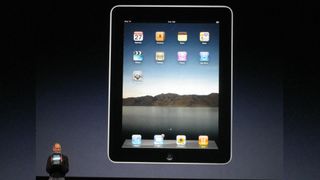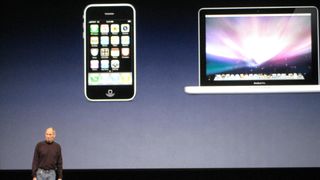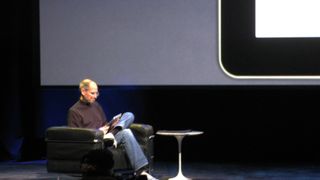Steve Jobs was wrong about the post-PC era and the next batch of iPads should embrace this
What is an iPad, really?

The original iPad was important enough to get its own live on-stage introduction by the late Steve Jobs. It was such a revolutionary idea that it predates the iPhone and we might've been using Apple's first tablet in 2007 if Steve Jobs hadn't steered the technology to a pocketable format.
After the January 27, 2010 launch, the world, for a time, seemed to revolve around Apple's iPad, a silicon, glass, and metal gadget so ground-breaking it rated its own storyline on the then wildly popular Modern Family TV series (it was really like a 22-minute ad with a lot of jokes).
It's a different story for the iPads we're expecting on May 7. Instead of a big, breathless live event, Apple will launch the tablets (and probably a new Apple Pencil) virtually. That means a pre-taped, Apple CEO Tim Cook-hosted affair that will breeze through four or more new gadgets with deep dives into the new screen technology (OLED?), new designs (thinner than ever!), wireless charging (oh, please make this so), and a completely reimagined Apple Pencil.
It'll be exciting, in a way, but also anti-climactic.
The first and best true tablet

14 years ago, I sat in the audience as Steve Jobs explained his vision for a post-PC world and the need for a device that sat between the then-popular Netbook laptops and its own wildly successful iPhone. Jobs didn't just explain this: behind him, the word "iPad" dramatically materialized between a netbook and an iPhone.
Jobs, a tiny figure before the screen, held up the iPad to wild applause.
From that point forward, Jobs dove into the demo, showing us photos, maps, newspapers, and apps on the 9.7-inch iOS screen (there was no iPadOS back then). As radical as the iPad introduction appeared, Jobs knew that we already understood the product. Since there are 75 million iPhones and iPods sold, there are, said Jobs, "over 75 million people who already know how to use the iPad."
Get daily insight, inspiration and deals in your inbox
Get the hottest deals available in your inbox plus news, reviews, opinion, analysis and more from the TechRadar team.
Like the showman he was, Jobs didn't hold back on hyperbole, declaring, "Our most advanced technology in a magical and revolutionary product at an unbelievable price." Much like the iPhone before it, the iPad started at a relatively affordable $499 and has only gotten more expensive since then.
A new era



Months later at the AllThingsD conference, Jobs said, "PCs are going to be like trucks. They are still going to be around [but] one out of x people will need them." Later he added, "We like to talk about the post-PC era, but when it really starts to happen, it's uncomfortable."
I praised Jobs as an "oracle," and the numbers backed him up. By 2011, Apple was reporting 15 million iPads sold and owned 90% of the tablet market share.
Job, though, was wrong and, in the intervening years, the iPad seen diminishing sales and has twisted itself through iPadOS updates and keyboard accessories into another ultra-computer option. It's a tablet but also a personal computer or "PC". There is no post-PC world, just a world of laptops and tablets that are racing toward the middle.
While the iPad has, with the Magic Keyboard and mouse support, become more laptop-like, traditional Windows laptops have adopted tablet features like touchscreens and stylus support.
The question for this next generation of iPads is whether they will further blur the line between PCs and tablets or reestablish the distinction. It was a self-contained slab that could do it all, without accessories
Aside from describing access to a full-size virtual keyboard (and, yes, a hardware keyboard that was almost unusable because it positioned the iPad just millimeters away from the top row of keys), Steve Jobs in 2010 illustrated how you could accomplish myriad entertainment, content, and productivity task through a touch screen. He positioned the original iPad as the best book and newspaper reader (The New York Times was a launch-day partner) but also a fantastic gaming platform. It could be your word processor and your spreadsheet manager. It was lighter than a Netbook but far prettier and a lot more fun to use.
Is it a PC?

Today's iPad, iPad Mini, and especially iPad Pro are laptops in tablet's clothing. With Apple Silicon (up to the M2 in the iPad Pro), they match the performance of last-generation MacBook Airs. The new models will surely feature M3 chips.
I'm not sorry the post-PC idea is dead. When Jobs floated it, I worked at a publication with "PC" in the name. I also knew consumers might not care so much about such technology labels. They loved the original iPad because it did so many things that a device of that form factor had never done (at least well) before. It satisfied their cravings for content and entertainment and, to their surprise, was built to last.
Apple iPads sold 8 or 9 years ago are still working, which is of course part of the problem. You can't be Post-anything if the products last forever.
For the iPad line, the potential to alter the trajectory of computing is gone but the opportunity to reestablish its place in the mobile technology market remains. Let's see if Apple chooses a new path.
You might also like

A 38-year industry veteran and award-winning journalist, Lance has covered technology since PCs were the size of suitcases and “on line” meant “waiting.” He’s a former Lifewire Editor-in-Chief, Mashable Editor-in-Chief, and, before that, Editor in Chief of PCMag.com and Senior Vice President of Content for Ziff Davis, Inc. He also wrote a popular, weekly tech column for Medium called The Upgrade.
Lance Ulanoff makes frequent appearances on national, international, and local news programs including Live with Kelly and Ryan, the Today Show, Good Morning America, CNBC, CNN, and the BBC.
Most Popular

